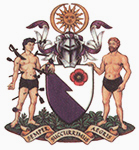History of the examinations
The first sitting of the College's examination was the Fellowship of the Faculty of Accident and Emergency Medicine (FFAEM) examination, equivalent to the current Final FRCEM, was in October 1996. In 2003 the College introduced an introductory examination, now the preferred route of entry to specialist registrar training, the Membership of the Faculty of A&E Medicine (MFAEM). [7]
Both examinations were renamed in 2006, as part of the creation of the College, as Fellowship of the College of Emergency Medicine (FCEM) and Membership of the College of Emergency Medicine (MCEM) respectively. [7] Their titles were further updated in 2015 when the college gained the "Royal" title, as the Membership of the Royal College of Emergency Medicine (MRCEM), and the higher Fellowship of the Royal College of Emergency Medicine (FRCEM).
In August 2016 further changes to the curriculum led to the merging of the examinations into a new FRCEM exam, split into three parts: the FRCEM Primary Examination, FRCEM Intermediate Certificate, and the FRCEM Final Examination. [8]
Further revisions in July 2021 saw the exams being separated out again; the FRCEM Primary and FRCEM Intermediate qualifications were depreciated and replaced with the MRCEM primary and MRCEM intermediate SBA examinations (which in the interim had continued as a qualification for doctors not in formal training programmes). [9] [10] [11]

